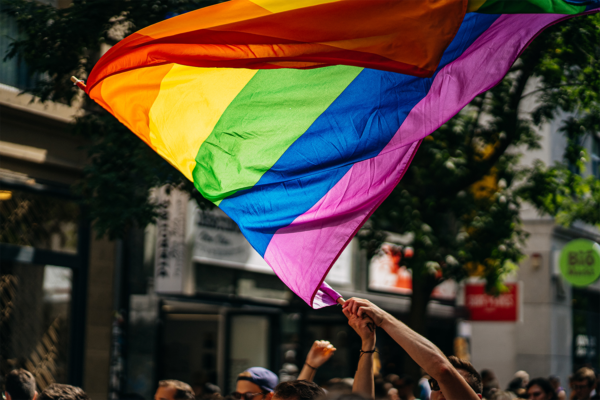
We are now approaching the end of Pride month, which in customary fashion has been marked by worldwide celebrations of queer love, and an alarming number of brands adopting rainbows – from the iconic M&S Pride Sandwich to the slightly short of the mark Burger King Whopper. As we mark the 50th anniversary of the UK’s first pride march, this month has marked a celebration of all the progress that has been made towards a world where LGBTQIA+ individuals can be themselves and live their lives to the full.
It has also been a stark reminder of how far we still need to go – with devastating news from Oslo on Saturday, and the Supreme Court’s ruling on Roe vs Wade marking a fundamental attack on human rights, throwing other established rights like gay marriage into doubt, in the US at least.
There have been moments of joy. I’ve just returned from Glastonbury, where Olly Alexander followed up his phenomenal 2019 pride speech (a must watch, if you haven’t seen it before) with his affirmation that he loves being gay, and “can’t recommend it enough”. Last weekend, Dame Kelly Holmes came out as gay. Her interviews and the press that surrounded it, and the follow up documentary released this weekend, demonstrate why coming out matters and the huge struggle of having to hide who you are.
Dame Kelly spoke at length about the impact her struggles around her sexuality had had on her mental health – exacerbated by her position as arguably the highest-profile British athlete of her generation. She’s not alone. According to NHS England, the evidence that LGBT people have disproportionately worse health outcomes and experiences of healthcare is “both compelling and consistent”. According to Rethink Mental Illness, LGBTQIA+ people are 1½ times more likely to develop depression and anxiety compared to the rest of the population, and face higher risk of suicidal behaviour and self-harm. The impacts stretch beyond mental health: according to NHS Digital, higher rates of LGB adults report bad or very bad health compared to heterosexual adults.
The reasons for this are complex – but include the experiences that LGBTQIA+ people will often have to deal with as a minority community, including stigma, prejudice and discrimination. Certainly, in Dame Kelly’s case, the combination of discrimination and stigma contributed to what she described as “28 years of heartbreak”. Stonewall’s research reveals almost one in four LGBT people have witnessed discriminatory or negative remarked by healthcare staff, and one in seven have avoided treatment for fear of discrimination. The situation for the trans community is even more complex: 45% of transgender individuals responding to Stonewall’s survey said healthcare staff lacked understanding of their health needs, and 24% fear discrimination from a healthcare provider. Outside of a healthcare setting, Stonewall’s research shows that almost one in five LGBT staff have been the target of negative comments or conduct from work colleagues because they are LGBT. One in eight trans people have been physically attacked by customers or colleagues, and one in ten (10%) black, Asian and minority ethnic LGBT staff have similarly been physically attacked because of their sexual orientation and/or gender identity – compared to 3% of white LGBT staff.
As a health policy practitioner and queer woman, I could have written a pride blog about many things – like LGBTQIA+ icons who have helped to change policy or the continued LGBTQIA+ health inequalities I touched on briefly above. But what Dame Kelly’s decision – and some of my own experiences over the course of my career to date – have made me realise is that actually what I wanted to write a blog about is the reasons why I’m proud to be open about my sexuality in the workplace.
Everyone has their own levels of comfort about what they want to share and I wholeheartedly support that. For me, having taken a while to get to the point, being authentic to myself at work means my life is easier, and I can do my best work. It matters to me because when I was younger it would have made a huge difference to me to have a representative figure to look up to – both at school and in the workplace. I am immensely lucky to work for an organisation which supports me and makes me feel comfortable enough to bring my whole self to work – and I’m happy to play a very small part in trying to make workplaces a more diverse and inclusive space. If recent events, and Kelly Holmes’ experience teach us anything, it is that representation and inclusion matters – and we can all play a role in helping to making that a reality.